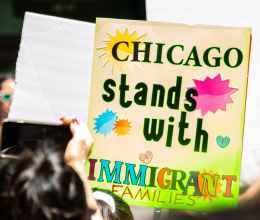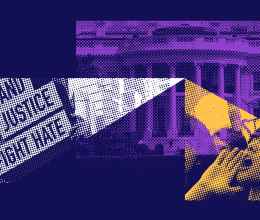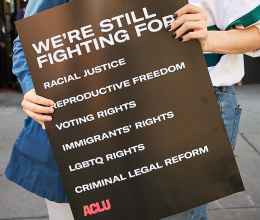
For more tips on voting in Florida, visit our 2024 Voter Information Center.
Every vote matters and your voice deserves to be heard. If you are transgender, nonbinary, or gender nonconforming, you may have had problems with someone questioning your identity because of your name, gender marker, or photo on your ID, or you may be nervous about whether this might happen. No one should question you about your identity, but this guide should help you if they do. We’ve compiled some Frequently Asked Questions for transgender, nonbinary, and gender nonconforming voters in Florida.
How do I vote? Why should I?
The ACLU of Florida has some helpful resources about how and why to vote: https://www.aclufl.org/en/know-your-rights/know-your-rights-while-voting
What if I don’t look like my ID photo anymore?
During early voting or on Election Day, all voters must present a photo ID with a signature. Your gender identity or presentation need not match your name, gender marker, or photo. If you can update your photo ID, try to update it to lessen the risk of encountering confusion when you arrive at the polls. Alternatively, you may bring an additional ID or utility bill (i.e. water or electricity bill with your name and the address where you are registered).
In 2024, Florida’s Department of Highway Safety and Motor Vehicles made it harder to update gender markers on state IDs. You should be able to vote regardless of the gender marker on your ID. However, you may wish to bring a different form of photo ID to avoid showing an ID that has incorrect information about your gender.
You may present any of the following acceptable photo identifications:
- Florida driver’s license;
- Florida identification card issued by the Department of Highway Safety and Motor Vehicles;
- United States passport;
- Debit or credit card;
- Military identification;
- Student identification;
- Retirement center identification;
- Neighborhood association identification;
- Public assistance identification;
- Veteran health identification card issued by the United States Department of Veterans Affairs;
- License to carry a concealed weapon or firearm;
- Employee identification card issued by any branch, department, agency, or entity of the Federal Government, the state, a county, or a municipality.
When you show a poll worker your photo ID, they should not be looking at the gender marker to verify your identity. A poll worker cannot prevent you from voting just because you don’t look like your picture or what the poll worker thinks you “should” look like based on your name or gender marker.
What if I changed my name since I last registered to vote? How do I update my voter registration?
If you are already registered to vote in Florida but need to update any information on your voter registration record, you can submit a change at this site: https://registertovoteflorida.gov/home. Using the online registration system permits you to complete a "Record Update/Change” (e.g., Address, Party Affiliation, Name, Signature). You can also call or email an address change to your county Supervisor of Elections.
If you are unable to update your name on the state website or with your county Supervisor before voting, you can also update your name in-person during Early Voting or at your designated precinct on Election Day. Florida law allows voters to update their name when they vote.
While no extra documentation or proof is needed to update your name, you can opt to bring a copy of the order granting your name change with you when you vote.
What happens if the poll worker still isn’t letting me vote?
Call the National Election Protection Hotline and let them know what is going on:
- English: 866-OUR-VOTE (866-687-8683)
- Español: 888-VE-Y-VOTA (888-839-8682)
- Asian & Pacific languages: 888-API-VOTE (888-274-8683)
- Arabic: 844-YALLA-US (844-925-5287)
- American Sign Language video call number: 301-818-VOTE (301-818-8683)
Fight for your right to vote. If all else fails, ask for a provisional ballot. If you cast a provisional ballot, you’ll need to follow up with your local election authority with additional information for your ballot to be counted and to determine if your ballot was counted. More information here: https://dos.fl.gov/elections/contacts/frequently-asked-questions/faq-voting/.





